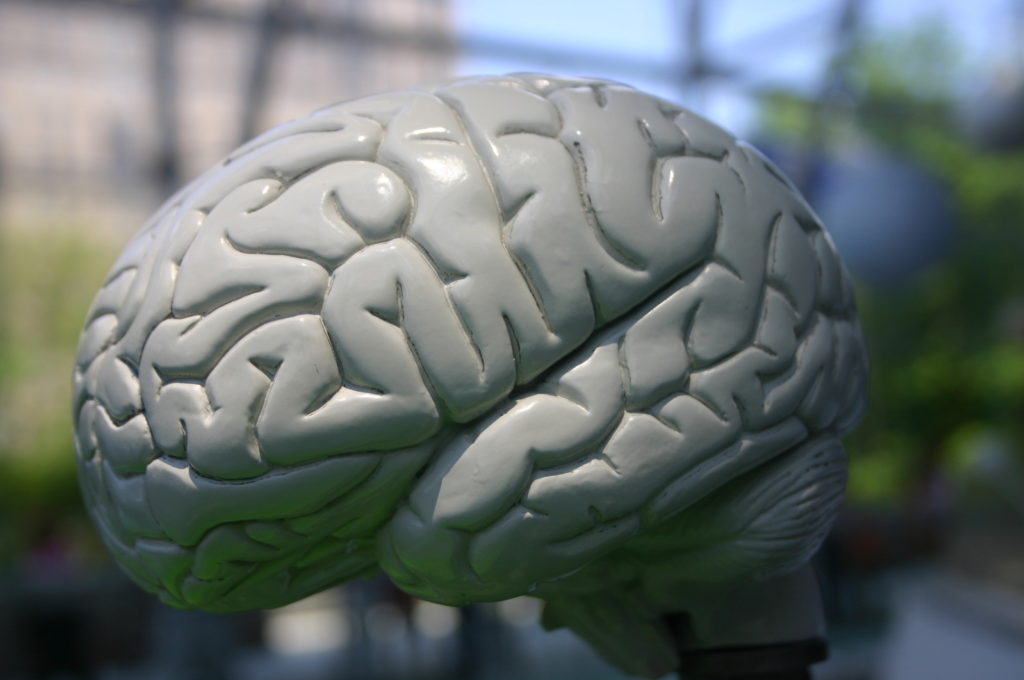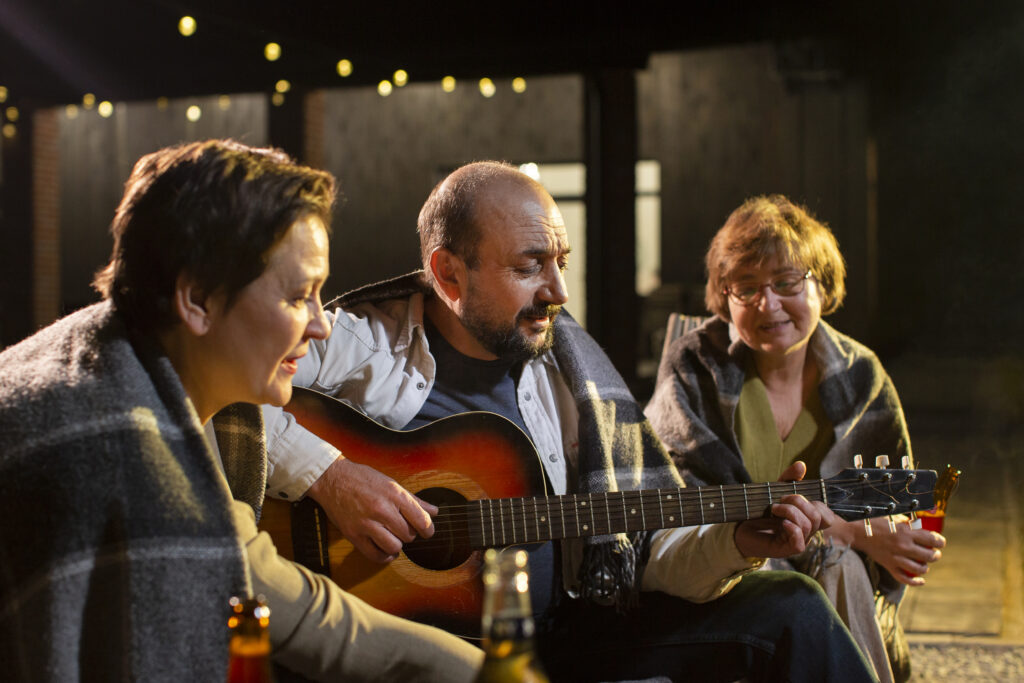Many Lehigh Valley residents have favorite songs that help us relax after a hectic day or get us moving on the dance floor. Music can also be a powerful gateway to memory; for example, a song from our past may bring back memories that trigger strong emotions.
But what is happening in our brains when we hear a song that is meaningful to us? Could music make older adults not only feel better but also improve their health? Much more research is needed before any definitive conclusions can be drawn, but there is growing scientific interest in music’s effects on the brain and body as we age.
How the brain is wired for music and memory

Psyche Loui, Ph.D., leads the Music, Imaging, and Neural Dynamics (MIND) Lab at Northeastern University in Boston. Interested in music and science most of her life, she first became curious about how music might help people with dementia while volunteering at a nursing home as a high school student.
After little response from residents with advanced dementia to the Beethoven pieces she played on the piano, staff members encouraged her to try something a bit livelier from a book of traditional folk songs. “I just played some old familiar ditties and tunes, and then, amazingly, some of the residents knew all the words and started singing along in close harmony,” said Loui. “That just really struck me.”
Our brains are hard-wired to predict and anticipate familiar rhythms and melodies, Loui explained. “When we hear something that we enjoy, that engages not only the auditory cortex, but also the brain’s reward systems that are driven by the neurotransmitter dopamine, which motivates us to seek out and learn new information.”
“If I’m listening to music that I’ve enjoyed throughout my life, and that I find familiar, then the auditory system is active, but it’s also communicating and connecting with the medial prefrontal cortex, which also processes memories about ourselves,” said Loui.
Loui’s latest project is designing and testing a device that pairs music selected by participants with rhythmic, colored LED light patterns. Loui and colleagues are working on prototypes to test the light and sound intervention as a potential therapy for older adults and people living with mild cognitive impairment or dementia.
Singing to build cognitive and social connections

Another interesting area of research is the exploration of whether music can strengthen connections between people, enhance social networks, and reduce isolation and loneliness among older adults.
Julene Johnson, Ph.D., blends her love of music and cognitive neuroscience as a professor at the University of California, San Francisco. Her current study is testing whether a musical improvisation intervention can improve cognition and brain function in older adults with mild cognitive impairment. “In improvisation, you have to be creative and generate new ideas,” Johnson said. “If you’re too critical of how you’re playing, that interferes with your ability to improvise.” The idea is to learn to tune out or turn off the brain’s critical thinking to get into an in-the-moment “zone.”
Soothing sleep with music in people living with dementia

People living with Alzheimer’s or a related dementia often experience sleep disturbances, such as insomnia or waking up during the night. These sleep problems can also disrupt their caregivers’ sleep, contributing to poorer physical and mental health in people who may already feel overwhelmed. For those living with dementia, sleep disruption has been associated with more time in healthcare facilities, poorer cognitive function, and faster disease progression.
Darina Petrovsky, Ph.D., R.N., of Rutgers University, is testing whether music can be an effective intervention to help ease these problems. A serious musician since age 7, Petrovsky studied piano performance as an undergraduate and later completed master’s and doctoral training in nursing.
Petrovsky and her team are developing and testing a mobile app called Calming Music Personalized for Sleep Enhancement in PeRsons living with Dementia (CoMPoSER). CoMPoSER helps caregivers tailor music to play before bedtime with the goal of a more restful night for all. CoMPoSER’s recipe for good sleeping music includes enjoyable songs from a person’s adolescence or early adulthood with a tempo of between 60 and 80 beats per minute, a pace similar to the average human heartbeat. “If you’re listening to something with fewer beats per minute, your heartbeat, your brain activity, and your breathing rate will gradually match those musical characteristics and bring your arousal state down,” she said.
Previous research has suggested that music without lyrics might be more conducive to sleep and that songs with high-pitched tones or faster, driving rhythms could be counterproductive to the rest and relaxation needed for sleep. Petrovsky is still not sure why instrumental music works better than songs with lyrics but suspects our curious brains are to blame. “Perhaps lyrics make the person think more about the meaning of a song as opposed to the emotion or the mood that the music is evoking.”
As the project expands, she is excited to explore if customized music could someday be an easily accessible, inexpensive tool that might help caregivers and people living with dementia get more and higher-quality sleep.
Testing music to reduce agitation and aggression
Other investigators are testing whether music can ease daytime dementia-related issues such as agitation, anxiety, and aggression, all of which can be troubling for people with dementia and their caregivers. The METRIcAL – Music and MEmory: A Pragmatic TRIal for Nursing Home Residents with ALzheimer’s Disease project, led by Vincent Mor, Ph.D., and his colleague Ellen McCreedy, Ph.D., MPH, with the Brown University School of Public Health, explored whether customized playlists of preferred music could reduce disruptive or disturbing behaviors like pacing, calling out verbally, sundowning, or other common dementia symptoms, and lessen reliance on antipsychotic drugs.
In tests, nursing staff had difficulty at times identifying the music residents liked, especially if the individual had advanced dementia and was unable to communicate finding “hits”—music or songs that sparked engagement and other positive emotions. Another similar trial is currently underway that is testing personalized music with nursing home residents with moderate to severe dementia. In that trial, the music will be preloaded on personalized music devices to increase engagement.
The “Alive Inside” documentary film depicts people living with severe Alzheimer’s who were previously minimally responsive, having dramatic emotional and physical reactions, including laughing, talking, tapping a foot, singing along, crying, or smiling when listening to music from their youth.
Working in harmony: How can we use what we know?
Researchers encourage families and caregivers to pay attention to how a person they are caring for responds when music is playing, and which songs they seem to connect with the most.
Evidence on the effectiveness of music on medical conditions continues to be collected. In the meantime, older adults who enjoy music can consider if they want to include it as part of their future care preferences.
Adapted from alzheimers.gov/news/could-musical-medicine-influence-healthy-aging#, accessed November 07, 2024.
South Mountain Memory Care, with our unique culture, “small house” model, and abundance of certified caregivers, offers you the peace of mind of knowing your loved one will be cared for as if they were our family—which they are!
South Mountain Memory Care is committed to providing individualized, compassionate care to support our residents in achieving a well-balanced lifestyle. We strive to allow our residents to remain independent while emphasizing safety. Our focus is to enrich their life—mind, body, and spirit—by bringing new initiatives into their day-to-day regimen while maintaining the activities they find comfort in. South Mountain Memory Care offers the peace of mind you deserve. When it comes to those you care so deeply about, we understand because we care, too.
